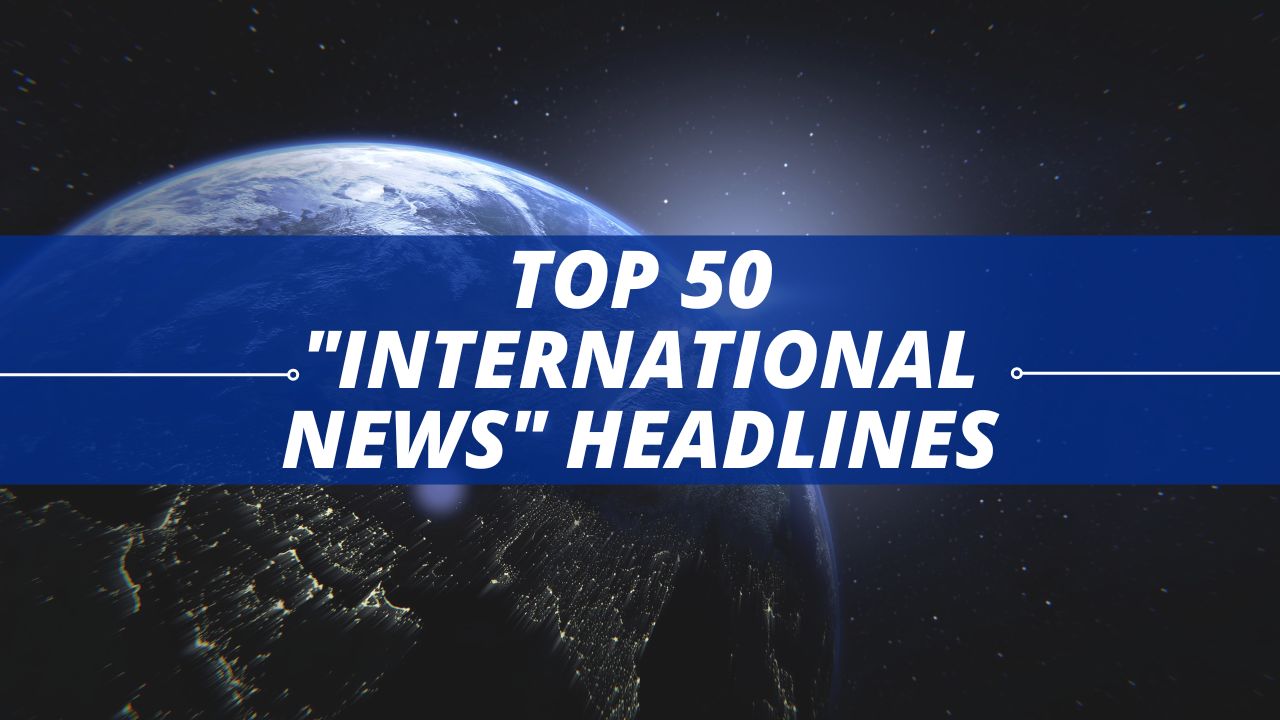
Top 50 “international news” headlines that involves focusing on global events, political developments, economic news, and major incidents. Here’s a general list:
Top 50 International News Headlines
- Global Leaders Gather for G20 Summit
- UN General Assembly: Key Debates and Resolutions
- Russia-Ukraine Conflict Escalates: Latest Updates
- China-Taiwan Tensions: Military Drills Intensify
- Middle East Peace Talks: New Diplomatic Efforts
- North Korea Launches New Missile: International Reactions
- EU Economic Forecast: Growth or Recession?
- Climate Change Summit: Nations Pledge New Goals
- Global Oil Prices Surge Amid Supply Concerns
- Africa’s Economic Challenges: Debt and Development
- Biden’s Foreign Policy: Impact on Global Alliances
- Iran Nuclear Deal: Negotiations Resume
- Tech Giants Under Scrutiny in Europe
- UK-EU Relations: Post-Brexit Trade Tensions
- Australia Wildfires: Response and Recovery Efforts
- Brazil’s Amazon Deforestation: Global Implications
- Japan’s Economic Outlook: Post-Pandemic Recovery
- India-Pakistan Relations: New Diplomatic Channels?
- Middle East Oil Market: OPEC+ Decisions
- Global Health: WHO’s Latest Pandemic Updates
- Turkey’s Economic Crisis: Inflation Soars
- South China Sea Disputes: Military Buildup
- Global Refugee Crisis: New Challenges and Solutions
- Israel-Palestine Conflict: Ceasefire Negotiations
- Cybersecurity Threats: Global Response to Hackers
- France’s Pension Reforms: Nationwide Protests
- Germany’s Energy Transition: Challenges and Successes
- Mexico’s Drug Cartel Violence: Government Response
- Italy’s Political Turmoil: Impacts on the EU
- African Union’s Role in Regional Conflicts
- Saudi Arabia’s Vision 2030: Progress and Challenges
- Venezuela’s Economic Collapse: Humanitarian Crisis
- Global Trade Wars: Impact on Emerging Markets
- Canada’s Immigration Policy: New Changes Announced
- International Space Station: New Collaboration Projects
- Economic Sanctions on Russia: Global Impacts
- South American Elections: Key Outcomes and Implications
- UN Report on Global Hunger: Rising Numbers
- Brazil’s Presidential Elections: A Nation Divided
- Middle East Energy Politics: US-Iran Relations
- Global Stock Markets: Morning Trends and Predictions
- Australia’s Climate Policy: New Government Initiatives
- China’s Belt and Road Initiative: Global Reactions
- India’s Space Program: Latest Achievements
- Africa’s Renewable Energy Projects: Investment Opportunities
- EU Migration Crisis: New Policies and Debates
- Japan’s Defense Strategy: Regional Implications
- Global Water Scarcity: International Cooperation Efforts
- Turkey-Syria Border Conflict: Latest Developments
- International Sports: Major Events and Updates
These headlines are designed to cover a wide range of topics that could be of interest to readers seeking international news in the morning.
Here are the 100-word descriptions for each of the top 50 international news headlines:
- Global Leaders Gather for G20 Summit
World leaders are convening at the G20 Summit to discuss pressing global issues, including economic recovery post-pandemic, climate change, and international trade. The summit brings together leaders from the world’s largest economies, aiming to foster cooperation on policies that can stimulate global growth. High on the agenda are debates on sustainable development, digitalization, and global health challenges. As countries grapple with inflation and geopolitical tensions, this summit is expected to play a crucial role in shaping future international economic policies and agreements. - UN General Assembly: Key Debates and Resolutions
The United Nations General Assembly is in session, with member states debating critical global issues such as climate change, conflict resolution, and human rights. This annual gathering provides a platform for countries to present their perspectives on pressing international challenges and propose resolutions aimed at fostering peace and security. Key topics this year include addressing global inequalities, strengthening multilateralism, and enhancing cooperation on pandemic preparedness. As the assembly progresses, significant resolutions are expected to emerge, impacting global governance and international relations. - Russia-Ukraine Conflict Escalates: Latest Updates
The conflict between Russia and Ukraine has escalated, with new developments sparking international concern. Recent military actions have intensified tensions in the region, leading to calls for diplomatic intervention. Both sides accuse each other of provocations, and the international community is closely monitoring the situation. Sanctions against Russia have been expanded, while humanitarian efforts are being mobilized to assist those affected by the conflict. The escalation threatens to destabilize the region further, with potential global implications if the situation continues to deteriorate. - China-Taiwan Tensions: Military Drills Intensify
Tensions between China and Taiwan have heightened as China conducts large-scale military drills near Taiwan’s airspace and waters. These exercises are seen as a show of force by Beijing, which views Taiwan as a breakaway province. Taiwan, however, maintains its status as a sovereign state and has bolstered its defenses in response. The international community, particularly the United States, is closely watching the situation, with concerns that the tensions could lead to a military confrontation. Diplomatic efforts are ongoing to de-escalate the situation and maintain regional stability. - Middle East Peace Talks: New Diplomatic Efforts
New diplomatic efforts are underway to revive peace talks in the Middle East, focusing on resolving longstanding conflicts between Israel and Palestine. The initiative, backed by international mediators, aims to address key issues such as borders, security, refugees, and the status of Jerusalem. Both sides have expressed cautious optimism, but deep-seated mistrust and recent violence pose significant challenges. The success of these talks could have far-reaching implications for regional stability and international relations, as well as for the lives of millions affected by the conflict. - North Korea Launches New Missile: International Reactions
North Korea has launched a new ballistic missile, drawing condemnation from the international community. The test, which North Korea claims is a demonstration of its self-defense capabilities, has heightened tensions in the region, particularly with South Korea, Japan, and the United States. The UN Security Council is expected to convene an emergency meeting to discuss potential responses, including additional sanctions. This missile launch underscores the ongoing challenges of denuclearization on the Korean Peninsula and the complexities of engaging with North Korea diplomatically. - EU Economic Forecast: Growth or Recession?
The European Union’s latest economic forecast presents a mixed picture, with some member states experiencing growth while others face the risk of recession. Factors such as inflation, energy prices, and the impact of the Russia-Ukraine conflict are contributing to economic uncertainty across the region. The report highlights the need for coordinated fiscal policies and investments in green and digital technologies to boost resilience. As the EU grapples with these challenges, the economic outlook remains uncertain, with potential implications for global markets and trade. - Climate Change Summit: Nations Pledge New Goals
At the latest Climate Change Summit, nations have pledged to set more ambitious goals to combat global warming. The summit, which brought together world leaders, environmental experts, and activists, focused on accelerating efforts to reduce greenhouse gas emissions, protect biodiversity, and transition to renewable energy. Several countries announced new targets for reducing carbon emissions by 2030, along with plans to phase out coal and invest in green technologies. The success of these pledges will depend on their implementation and the ability of nations to work together to address the climate crisis. - Global Oil Prices Surge Amid Supply Concerns
Global oil prices have surged due to concerns over supply disruptions, particularly in the wake of geopolitical tensions in the Middle East and production cuts by major oil-exporting countries. The price increase is putting pressure on consumers and industries worldwide, contributing to rising inflation in many economies. Energy analysts warn that if the situation persists, it could lead to higher costs for transportation, manufacturing, and heating, impacting global economic growth. Governments are exploring ways to stabilize the market, including tapping into strategic reserves and seeking alternative energy sources. - Africa’s Economic Challenges: Debt and Development
Africa faces significant economic challenges as it grapples with mounting debt, slow growth, and the impact of the COVID-19 pandemic. Many countries on the continent are struggling to meet their debt obligations while also addressing pressing development needs such as infrastructure, healthcare, and education. International financial institutions are urging for debt relief and increased investment in sustainable development projects. African leaders are also seeking to diversify their economies and reduce reliance on commodity exports. The outcome of these efforts will be crucial for the continent’s long-term economic stability and growth. - Biden’s Foreign Policy: Impact on Global Alliances
President Joe Biden’s foreign policy is reshaping global alliances as the U.S. seeks to strengthen ties with traditional allies while addressing challenges from adversaries like China and Russia. Biden’s approach emphasizes multilateralism, human rights, and climate change, marking a shift from the previous administration’s more unilateral stance. The administration’s efforts to restore relationships with NATO, the European Union, and other international partners are being closely watched. However, tensions remain in areas such as trade, defense spending, and global security, making it clear that maintaining these alliances will require ongoing diplomatic efforts. - Iran Nuclear Deal: Negotiations Resume
Negotiations to revive the Iran nuclear deal have resumed, with world powers seeking to bring Iran back into compliance with the agreement. The talks, taking place in Vienna, aim to resolve issues related to Iran’s nuclear program and the lifting of economic sanctions. Iran has signaled its willingness to return to the deal but insists on the removal of all sanctions as a precondition. The outcome of these negotiations will have significant implications for regional security in the Middle East and the broader international community, particularly in terms of non-proliferation efforts. - Tech Giants Under Scrutiny in Europe
European regulators are intensifying their scrutiny of tech giants such as Google, Apple, Amazon, and Facebook, amid concerns over anti-competitive practices, data privacy, and market dominance. The European Union is moving forward with new legislation, including the Digital Markets Act (DMA) and the Digital Services Act (DSA), aimed at curbing the power of these companies and ensuring fair competition. The increased regulation could lead to significant changes in how tech companies operate in Europe, potentially setting a precedent for other regions. The outcome of these regulatory efforts will be closely watched globally. - UK-EU Relations: Post-Brexit Trade Tensions
Tensions between the UK and the European Union continue to simmer post-Brexit, particularly over trade arrangements in Northern Ireland. The UK government is pushing for changes to the Northern Ireland Protocol, arguing that it disrupts trade between Northern Ireland and the rest of the UK. The EU, however, insists on maintaining the current terms to protect the integrity of the single market. These disputes are straining relations and could lead to further complications in trade, investment, and cooperation between the UK and EU. Diplomatic efforts are ongoing to find a resolution. - Australia Wildfires: Response and Recovery Efforts
Australia is grappling with another devastating wildfire season, with blazes destroying homes, wildlife habitats, and vast areas of land. The government and emergency services are deploying resources to contain the fires and provide relief to affected communities. The wildfires are being fueled by extreme weather conditions, including high temperatures and strong winds, which have been exacerbated by climate change. Recovery efforts are also focused on rebuilding infrastructure and supporting displaced residents. The situation has reignited debates over Australia’s climate policies and the need for more robust measures to prevent future wildfires. - Brazil’s Amazon Deforestation: Global Implications
Deforestation in Brazil’s Amazon rainforest has reached alarming levels, raising global concerns about the environmental and climate impacts. The Amazon, often referred to as the “lungs of the Earth,” plays a crucial role in absorbing carbon dioxide and maintaining global biodiversity. The increased deforestation is driven by illegal logging, agriculture, and mining activities, often with the tacit approval of local and federal authorities. International pressure is mounting on Brazil to take stronger action to protect the Amazon, as the loss of this vital ecosystem could have severe consequences for the planet’s climate stability. - Japan’s Economic Outlook: Post-Pandemic Recovery
Japan’s economic recovery from the COVID-19 pandemic remains fragile, with challenges such as an aging population, slow wage growth, and supply chain disruptions. The government has implemented a series of stimulus measures to boost domestic consumption and support businesses, but uncertainties persist. Japan is also focusing on digital transformation and green growth as key pillars for future economic development. However, external factors such as global inflation and geopolitical tensions could impact Japan’s recovery trajectory. Analysts are closely monitoring these developments to assess Japan’s economic outlook in the coming years. - India-Pakistan Relations: New Diplomatic Channels? India and Pakistan are exploring new diplomatic channels to address longstanding disputes, particularly over the Kashmir region. The two nuclear-armed neighbors have a history of conflict, but recent developments suggest a willingness to engage in dialogue. Both countries have taken steps to reduce cross-border tensions and are reportedly considering back-channel talks. The international community is cautiously optimistic about these efforts, which could lead to a thaw in relations. However, significant challenges remain, including domestic political pressures and deep-seated mistrust between the two nations.
- Middle East Oil Market: OPEC+ Decisions
The Middle East oil market is facing uncertainty as OPEC+ (Organization of the Petroleum Exporting Countries and allies) makes critical decisions on production levels. The group, which includes major oil producers like Saudi Arabia and Russia, is balancing the need to support oil prices with concerns about global economic growth and energy demand. Recent meetings have resulted in agreements to adjust production quotas, but the market remains volatile. The decisions made by OPEC+ will have significant implications for global energy markets, particularly as the world transitions to cleaner energy sources. - Global Health: WHO’s Latest Pandemic Updates
The World Health Organization (WHO) has issued its latest updates on the global pandemic, highlighting ongoing challenges in controlling the spread of COVID-19 and emerging variants. While vaccination rates have improved in many countries, disparities in access to vaccines and treatments persist, particularly in low-income regions. The WHO is urging nations to remain vigilant, continue public health measures, and increase efforts to vaccinate vulnerable populations. The organization also emphasized the importance of preparing for future pandemics by strengthening global health systems and ensuring equitable access to medical resources. - Turkey’s Economic Crisis: Inflation Soars
Turkey is facing a severe economic crisis, with inflation reaching record levels and the national currency, the lira, continuing to lose value. The crisis has been exacerbated by high energy prices, rising import costs, and a lack of investor confidence. The Turkish government’s unconventional monetary policies, including repeated interest rate cuts, have been criticized for worsening the situation. The economic instability is leading to widespread public discontent, with protests against the government’s handling of the economy. The crisis is also impacting Turkey’s regional and international relations as it seeks financial support. - South China Sea Disputes: Military Buildup
The South China Sea continues to be a flashpoint for military tensions, with several countries, including China, the United States, and Southeast Asian nations, increasing their military presence in the region. China’s construction of artificial islands and militarization of disputed areas have raised concerns about freedom of navigation and regional security. The United States has conducted freedom of navigation operations to challenge China’s territorial claims, while other regional powers are bolstering their defenses. Diplomatic efforts to resolve the disputes have made little progress, and the risk of conflict remains a significant concern. - Global Refugee Crisis: New Challenges and Solutions
The global refugee crisis is reaching unprecedented levels, with millions of people displaced due to conflicts, persecution, and climate change. Countries hosting large numbers of refugees are struggling to provide adequate support, while international agencies are calling for more funding and coordinated efforts to address the crisis. New challenges, such as the rise in climate refugees and the impact of the COVID-19 pandemic, are exacerbating the situation. There is an urgent need for long-term solutions, including more equitable refugee resettlement programs, improved humanitarian aid, and policies that address the root causes of displacement. - Israel-Palestine Conflict: Ceasefire Negotiations
Ceasefire negotiations between Israel and Palestinian factions are underway, following a recent surge in violence in the Gaza Strip and the West Bank. Mediated by international actors, including Egypt and the United Nations, the talks aim to prevent further escalation and address underlying issues such as border crossings, access to resources, and humanitarian aid. While both sides have expressed a willingness to reach a temporary truce, deep-rooted mistrust and ongoing provocations threaten the fragile peace. The outcome of these negotiations will be critical in determining the future of the Israel-Palestine conflict. - Cybersecurity Threats: Global Response to Hackers
Cybersecurity threats are on the rise, with state-sponsored hackers and criminal organizations targeting critical infrastructure, businesses, and government agencies worldwide. Recent high-profile cyberattacks have highlighted the vulnerabilities in global digital networks and the need for stronger defenses. Countries are increasing their cybersecurity measures, including investing in technology, enhancing international cooperation, and imposing sanctions on nations linked to cyberattacks. The global response also involves public-private partnerships to improve information sharing and develop more robust security protocols. As cyber threats evolve, staying ahead of hackers remains a top priority for governments and organizations. - France’s Pension Reforms: Nationwide Protests
France is witnessing widespread protests in response to the government’s proposed pension reforms, which aim to raise the retirement age and streamline the pension system. The reforms, part of President Emmanuel Macron’s broader economic agenda, have sparked opposition from labor unions and workers who argue that the changes will disproportionately affect low-income and manual laborers. The protests have led to disruptions across the country, including strikes in transportation, education, and public services. The government is in talks with union leaders to find a compromise, but the situation remains tense, with further demonstrations expected. - Germany’s Energy Transition: Challenges and Successes
Germany is undergoing a major energy transition, known as the “Energiewende,” aimed at phasing out nuclear power and fossil fuels in favor of renewable energy sources. While the country has made significant progress in expanding wind and solar energy, the transition faces challenges such as ensuring energy security, managing costs, and addressing public opposition to infrastructure projects. The recent surge in energy prices has added to the complexity of the transition. Despite these hurdles, Germany remains committed to its climate goals, with plans to further reduce carbon emissions and increase the share of renewables in its energy mix. - Mexico’s Drug Cartel Violence: Government Response
Mexico is grappling with escalating violence linked to drug cartels, which continue to exert control over large parts of the country. The government’s strategy to combat the cartels, including the deployment of the military and enhanced law enforcement efforts, has had limited success. Violence has surged in several regions, leading to concerns about public safety and the rule of law. The situation is further complicated by corruption and the influence of organized crime within government institutions. The international community is watching closely, as the violence also impacts drug trafficking routes and migration patterns. - Italy’s Political Turmoil: Impacts on the EU
Italy is experiencing political turmoil, with frequent changes in government and rising populist sentiments posing challenges to the country’s stability. The instability is impacting Italy’s ability to implement necessary economic reforms and manage its public debt, raising concerns within the European Union. As one of the EU’s largest economies, Italy’s political and economic health is crucial to the stability of the Eurozone. The situation is also affecting Italy’s influence within the EU, particularly on issues such as migration, fiscal policy, and relations with other member states. - African Union’s Role in Regional Conflicts
The African Union (AU) is increasingly taking on a leadership role in addressing regional conflicts across the continent. The organization is involved in peacekeeping missions, mediation efforts, and diplomatic initiatives aimed at resolving disputes in countries such as Ethiopia, Sudan, and the Central African Republic. The AU’s efforts are supported by international partners, but the organization faces challenges, including limited resources, political complexities, and the need for greater coordination among member states. The AU’s effectiveness in managing these conflicts is crucial for achieving long-term stability and development in Africa. - Saudi Arabia’s Vision 2030: Progress and Challenges
Saudi Arabia’s Vision 2030 initiative is a sweeping plan aimed at diversifying the kingdom’s economy away from oil dependency and towards sectors such as tourism, entertainment, and technology. The initiative has led to significant economic reforms, including the development of new industries, infrastructure projects, and social changes such as expanding women’s rights. However, the plan faces challenges, including global economic uncertainties, regional geopolitical tensions, and the need for further social and political reforms. The success of Vision 2030 is critical for Saudi Arabia’s future economic stability and its role in the global economy. - Venezuela’s Economic Collapse: Humanitarian Crisis
Venezuela is in the midst of a severe economic collapse, leading to a humanitarian crisis that has displaced millions of people and left much of the population in poverty. Hyperinflation, food and medicine shortages, and a breakdown in public services have exacerbated the situation. The government, led by President Nicolás Maduro, faces international sanctions and widespread criticism for its handling of the crisis. Humanitarian aid is being provided by international organizations, but access remains limited due to the political situation. The crisis is having a profound impact on the region, with neighboring countries struggling to accommodate Venezuelan refugees. - Global Trade Wars: Impact on Emerging Markets
Global trade wars, particularly between the United States and China, are having a significant impact on emerging markets. Tariffs and trade barriers are disrupting supply chains, increasing costs for businesses, and leading to economic uncertainty in developing countries that rely on exports. These trade tensions are also affecting global investment flows, with some emerging markets experiencing capital outflows and currency depreciation. Governments in these regions are seeking to diversify their trade relationships and develop strategies to mitigate the impact of the trade wars. The situation remains fluid, with potential long-term implications for global economic growth. - Canada’s Immigration Policy: New Changes Announced
Canada has announced new changes to its immigration policy, aimed at attracting skilled workers and addressing labor shortages in key industries. The government is expanding pathways for permanent residency and citizenship, particularly for professionals in sectors such as technology, healthcare, and engineering. The changes also include measures to improve the integration of immigrants into Canadian society, including language training and support services. The policy shift is part of Canada’s broader strategy to boost economic growth and address demographic challenges, such as an aging population. The new immigration policies are expected to have significant implications for Canada’s economy and labor market. - South America’s Political Landscape: Shifting Alliances
South America’s political landscape is undergoing significant changes, with shifting alliances and the rise of new political movements across the continent. Countries like Brazil, Argentina, and Chile are seeing increased polarization, with populist leaders gaining support in some areas while others push for more progressive policies. These shifts are impacting regional cooperation on issues such as trade, security, and environmental protection. The changing political dynamics are also influencing South America’s relationships with global powers, including the United States, China, and the European Union. The region’s political future remains uncertain, with potential implications for stability and development. - Arctic Melting: Global Environmental Impact
The Arctic is experiencing unprecedented levels of ice melt, with profound implications for the global environment. The loss of sea ice is contributing to rising sea levels, which threaten coastal communities worldwide. Additionally, the melting ice is disrupting ecosystems and wildlife in the region, while also opening up new shipping routes and access to natural resources. Scientists warn that the Arctic’s rapid warming is a sign of accelerating climate change, with the potential to trigger feedback loops that could further destabilize the global climate system. International efforts to mitigate the impact are critical for preserving the Arctic and addressing climate change. - NATO’s Role in Global Security: New Challenges
NATO is facing new challenges as it adapts to a changing global security environment. The alliance is grappling with issues such as cybersecurity threats, the rise of authoritarian regimes, and shifting power dynamics in regions like Eastern Europe and the Asia-Pacific. NATO is also reassessing its strategic priorities in light of the Russia-Ukraine conflict and the increasing influence of China on the world stage. The alliance is seeking to strengthen its collective defense capabilities, enhance cooperation among member states, and address emerging security threats. The future of NATO’s role in global security will depend on its ability to adapt to these evolving challenges. - Lebanon’s Economic Crisis: International Aid Efforts
Lebanon is facing an economic crisis of unprecedented proportions, with the country’s currency losing value, inflation soaring, and basic services collapsing. The situation has led to widespread poverty, political instability, and mass protests. The international community has pledged aid to Lebanon, but efforts have been hampered by corruption, mismanagement, and the lack of a functioning government. Humanitarian organizations are working to provide essential services, but the scale of the crisis requires a comprehensive response. Lebanon’s future remains uncertain, with the potential for further deterioration if substantial reforms are not implemented. - New Zealand’s Climate Policies: Global Leadership
New Zealand is positioning itself as a global leader in climate policy, with ambitious targets for reducing greenhouse gas emissions and transitioning to a low-carbon economy. The government has introduced measures such as a zero-carbon law, investments in renewable energy, and initiatives to protect biodiversity. New Zealand’s climate policies are also focused on addressing the impacts of climate change on vulnerable communities, both domestically and in the Pacific region. The country’s leadership on climate issues is gaining international recognition, but challenges remain, including balancing economic growth with environmental sustainability and ensuring that all sectors of society benefit from the transition. - Indonesia’s Deforestation Crisis: Government Action
Indonesia is facing a deforestation crisis, with large areas of its rainforests being cleared for palm oil plantations, logging, and agriculture. The loss of these forests is contributing to climate change, biodiversity loss, and environmental degradation. The Indonesian government has announced new measures to combat deforestation, including stricter enforcement of environmental laws, the promotion of sustainable practices, and the restoration of degraded lands. However, the effectiveness of these actions is being questioned, with concerns about corruption, weak governance, and the influence of powerful business interests. The outcome of Indonesia’s efforts to curb deforestation will have significant implications for global environmental health. - ASEAN’s Role in Regional Stability
The Association of Southeast Asian Nations (ASEAN) is playing an increasingly important role in promoting regional stability and addressing conflicts in Southeast Asia. The organization is involved in mediating disputes, fostering economic cooperation, and coordinating responses to challenges such as the South China Sea tensions and the Myanmar crisis. ASEAN’s ability to maintain unity among its diverse member states is crucial for its effectiveness in addressing regional issues. The organization is also working to enhance its global influence by building partnerships with other regional and international organizations. The future of ASEAN’s role in regional stability will depend on its capacity to navigate complex geopolitical dynamics. - Global Food Security: Impact of Climate Change
Climate change is having a profound impact on global food security, with extreme weather events, changing precipitation patterns, and rising temperatures affecting agricultural production worldwide. Regions that rely on rain-fed agriculture, such as Sub-Saharan Africa and South Asia, are particularly vulnerable to climate-induced food shortages. The situation is exacerbated by conflicts, economic instability, and population growth, leading to increased hunger and malnutrition in many parts of the world. International organizations are calling for urgent action to build more resilient food systems, promote sustainable agricultural practices, and ensure access to nutritious food for all. - US-China Trade Relations: New Developments
Trade relations between the United States and China remain tense, with both countries imposing tariffs and restrictions on each other’s goods and services. Recent developments include negotiations to ease trade tensions and address issues such as intellectual property rights, market access, and technology transfer. While some progress has been made, significant challenges remain, including geopolitical tensions, differing economic systems, and concerns about national security. The outcome of these trade negotiations will have a major impact on the global economy, particularly for industries that rely on US-China trade. The situation continues to evolve, with potential for further escalation or resolution. - Afghanistan Humanitarian Crisis: International Response
Afghanistan is facing a severe humanitarian crisis following the Taliban’s takeover of the country. The collapse of the economy, combined with drought and food shortages, has left millions of Afghans in desperate need of assistance. International aid organizations are working to provide emergency relief, but access is limited by security concerns and restrictions imposed by the Taliban. The international community is grappling with how to respond to the crisis, balancing the need to provide aid with concerns about legitimizing the Taliban regime. The situation in Afghanistan remains dire, with ongoing risks of famine, displacement, and human rights abuses. - European Migration Crisis: Border Tensions
Europe is experiencing renewed tensions over migration, with an increase in the number of people seeking asylum and crossing borders illegally. Countries such as Greece, Italy, and Spain are on the front lines, struggling to manage the influx of migrants from Africa, the Middle East, and South Asia. The situation is straining the European Union’s asylum system and leading to disagreements among member states over burden-sharing and border security. The crisis is also being exploited by populist movements, fueling anti-immigrant sentiment and challenging the EU’s commitment to human rights and solidarity. Efforts to address the crisis continue, but solutions remain elusive. - Brazil’s Political Landscape: Upcoming Elections
Brazil is gearing up for its upcoming elections, with the political landscape marked by deep polarization and uncertainty. Incumbent President Jair Bolsonaro is seeking re-election, but faces strong opposition from former President Luiz Inácio Lula da Silva and other candidates. Key issues in the election include the economy, public health, and environmental policies, particularly in relation to the Amazon rainforest. The election is being closely watched both domestically and internationally, as it will have significant implications for Brazil’s future direction and its role in global affairs. The outcome could also impact regional stability in South America. - Philippines’ South China Sea Strategy
The Philippines is reassessing its strategy in the South China Sea, amid ongoing territorial disputes with China and other neighboring countries. The government is balancing its need to defend its maritime claims with the desire to maintain economic and diplomatic ties with China. The Philippines has sought support from the United States and other allies to strengthen its position, while also engaging in bilateral negotiations with China. The situation in the South China Sea remains volatile, with the potential for conflict if tensions escalate further. The Philippines’ approach to this issue will be critical in shaping the future of regional security. - Global Vaccine Distribution: Equity and Access
The global distribution of COVID-19 vaccines remains uneven, with significant disparities in access between high-income and low-income countries. While vaccination rates are high in many developed countries, large parts of the developing world are still struggling to secure enough doses. This inequity is prolonging the pandemic and increasing the risk of new variants emerging. International organizations and governments are working to address these disparities through initiatives such as COVAX, but challenges such as supply chain issues, vaccine hesitancy, and political obstacles persist. Ensuring equitable access to vaccines is crucial for ending the pandemic and preventing future global health crises. - European Green Deal: Progress and Challenges
The European Green Deal is the EU’s ambitious plan to make Europe the first climate-neutral continent by 2050. The deal includes a wide range of measures aimed at reducing carbon emissions, promoting renewable energy, and improving energy efficiency. Progress has been made in areas such as renewable energy adoption and emissions reductions, but challenges remain, including financing the transition, ensuring social equity, and dealing with opposition from industries affected by the changes. The success of the European Green Deal will have significant implications not only for Europe but also for global efforts to combat climate change. - Sri Lanka’s Economic Crisis: Government Response
Sri Lanka is facing a severe economic crisis, characterized by high inflation, rising debt, and shortages of essential goods. The crisis has led to widespread public protests and calls for government reforms. The government has sought financial assistance from international organizations, including the International Monetary Fund (IMF),







